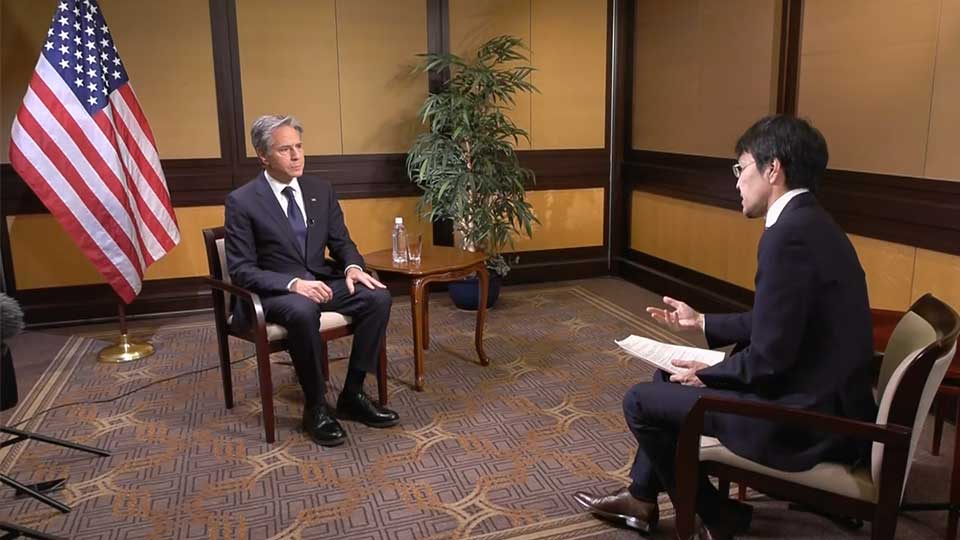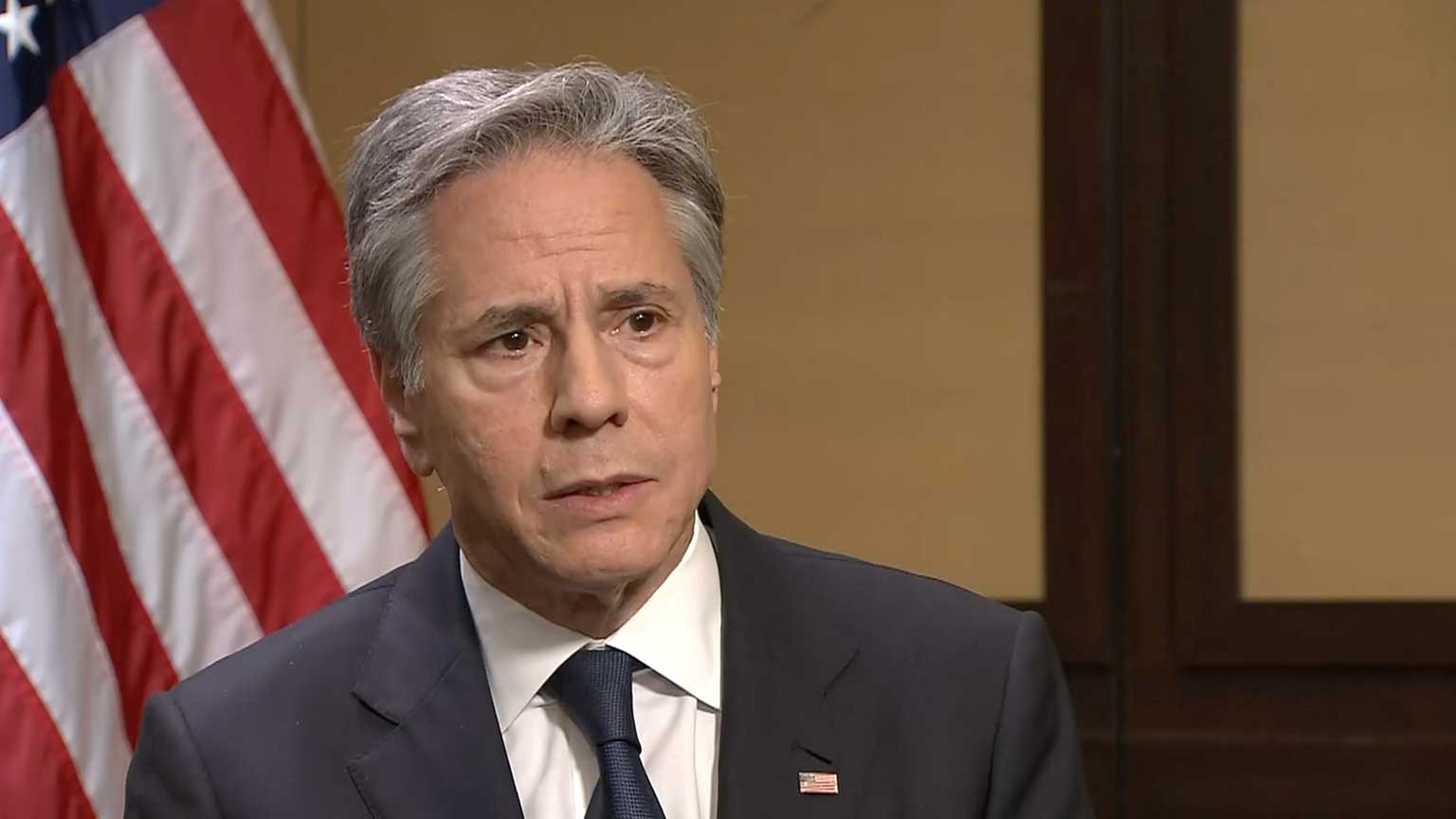Ishii Yusaku: As you have repeatedly mentioned, Israel has a right to defend itself. But at the same time, that does not mean it can do anything — that's what we all understand. And I believe that is one of the reasons why you have frequently visited Israel since October 7, spoken with Prime Minister Benjamin Netanyahu and asked him to take every possible measure to minimize civilian casualties in Gaza. But despite that, what we are seeing in Gaza is a continuing increase in civilian casualties. What do you think?
Antony Blinken: Well, first, as you said, we — and many other countries, including the G7 countries in our communique — made clear that Israel has a right to defend itself to try to ensure that what happened on October 7 never happens again, but to do so in accordance with international humanitarian law.
And there are additional steps that we believe Israel can and should take to minimize civilian casualties and to minimize the suffering of people. It's a very difficult challenge because what Hamas does is intentionally embed itself in the midst of civilians. It places its commanders, its command posts, its weapons, its munitions in or under residential buildings, schools, mosques, hospitals. But nonetheless, Israel still has an obligation to distinguish between terrorists and civilians.
And so part of my conversation with the prime minister was about additional steps that we believe can and should be taken to try to minimize civilian casualties. We all want to see that. At the same time, we're working to dramatically increase the humanitarian assistance that's going into Gaza so that people can get the food, the water, the medicine, the other things that they need to live every day. And we're making important progress on that.
Ishii: But do you believe that the Israelis are doing enough to minimize civilian casualties?
Blinken: As I said, we believe there are additional steps that can and should be taken to try to minimize civilian casualties. And it was very much part of the conversation that I had this week.
Ishii: At the press conference (after the G7 foreign ministerial talks on Wednesday) you talked about the future. Israel says its goal is to eliminate Hamas, but is that possible? Is that a goal the United States shares with Israel?
Blinken: I think any country faced with what Israel suffered on October 7, the slaughter of its civilians — men, women, children, babies, elderly people, even Holocaust survivors — no country could tolerate that; no country could accept that.
And every country faced with that situation would want not only to defend itself — and by the way, that's still necessary because Hamas continues to launch rockets at Israel; there have been more than 7,000 rockets launched at Israel since October 7 — but also to try to take steps to ensure that it doesn't happen again. That's, I think, the main objective — to make sure to the best of Israel's ability that it can't happen again.
Ishii: But we all know that even if you could physically eliminate Hamas, Hamas is an ideology. So the cycle of violence and hatred will not end. Are we on the right track?
Blinken: So you're exactly right that, ultimately, of course, you can do everything possible to ensure that something like October 7 never happens again, but to the extent that Hamas has hijacked an idea — because Hamas is not the Palestinian people; it doesn't represent them. It doesn't represent their aspirations. But to the extent that it's hijacked that idea, then the only way ultimately to ensure lasting peace and security is with a better idea, a stronger idea.
And clearly, for the United States and for many other countries, that idea must lead to a Palestinian state. Ultimately, Palestinians and Israelis alike have the right to live in their own states with equal measures of opportunity, of security, of dignity.
And so even as we're trying to deal with the crisis in the moment, we also have to be thinking now about how to get how to get on that track. And that's the most durable way of ensuring lasting peace, lasting security.
Ishii: So how will the US be involved in terms of stabilizing the area?
Blinken: Well, there are two different questions.
There's the immediate post-conflict future, which goes to Gaza itself, and we believe there are certain basic ideas and principles that we need to be clear about. We can't have Hamas governing Gaza because that simply invites a repeat of October 7. We also can't have an Israeli reoccupation of Gaza. It can't be used as a platform by anyone to launch terrorist attacks. The Palestinian people cannot be displaced from Gaza. And, ultimately, there needs to be governance that joins the West Bank and Gaza, and, as we've said, we believe, a Palestinian state.
The steps to get there, the elements of how you would get there, are exactly what we're thinking about — many other countries are thinking about — right now. So even as all of us work on dealing with the day of, we do have to be thinking about the day after.
Ishii: The US is urging Israel to agree on a humanitarian pause, but we haven't seen that happen yet. Could you describe where we are now?
Blinken: So we think that for many of the objectives that we have, humanitarian pauses could be very beneficial. Very beneficial to getting a lot more humanitarian assistance into Gaza; beneficial to helping people from other countries who are stuck in Gaza get out of Gaza; and beneficial to something that's critical for Israel, for us, for many other countries, and that is securing the release of hostages that are being held by Hamas — more than 200 of them. So we think pauses could be very helpful for all of those purposes.
We had a good, important discussion with the government of Israel about that. We agreed that we would work together to answer a lot of very legitimate questions that they had about how such pauses would work, and again, how they would actually help advance those objectives. We're engaged in that process now and it's something we're going to pursue.
And the G7 communique makes clear that all the G7 supports humanitarian pauses.
Ishii: But Israel has not yet agreed on imposing a humanitarian pause.
Blinken: Well, this is a process, and we agreed that we needed to answer — as we're working on — some of the questions they raised about how these would work. And, critically, it's very important to advance the release of hostages. This is something that is very important to Israel; it's important to us. We have 10 Americans who we believe are being held hostage. We also lost more than 30 of our citizens in the slaughter that took place on October 7.
Ishii: And Axios has reported that President Biden has had a phone call with Prime Minister Netanyahu and asked for a three-day pause. Can you confirm it?
Blinken: I'm not going to reveal diplomatic conversations. I can tell you that they've had numerous conversations, including during President Biden's visit to Israel, and our teams are in regular communication. And we share our own views, our own experiences, our own lessons learned from things that we've been engaged in in the past. We share our concerns; we share our expectations. And that's part of an ongoing conversation with Israel, and the president, of course, is deeply engaged in that himself.
Ishii: And I need to ask you about China. President Joe Biden is expected to meet the Chinese president next week. And given the situations in Ukraine and the Middle East, can the U.S. handle these three issues at once in terms of resources?
Blinken: We can and we are. I'm, of course, here in Japan; I'm heading to South Korea and then to India. So we and I have an intense focus on the Indo-Pacific. Just a little over a week ago, China's Foreign Minister Wang Yi was in Washington for extensive discussions with me, with National Security Advisor Jake Sullivan, with President Biden. And we expect that the leaders will meet at APEC next week. We're working on that right now. And it's very important that we have these leader-to-leader discussions — conversations — to look at areas where the United States and China, and others, can cooperate, as well as how we can deal with our very real differences but to do so in a responsible way.
So we're fully engaged in the Indo-Pacific. And, of course, next week the president and most of the national security team will be spending almost the entire week with the APEC countries.
Ishii: So the US is not moving its resources back to the Middle East?
Blinken: We can and we are dealing with both the urgent challenge of the moment — the crisis in the Middle East — while making sure that we're engaged very effectively on what is one of our most important core interests, and that is the Indo-Pacific. For us, it really is the future. And in terms of issues that are affecting the daily lives of American citizens, as a Pacific country ourselves, this is an area of sustained focus for the administration.
It's also one of the reasons that being here in Japan — not just for the G7 but for consultations with the government on many of the things that we're working on together in the Indo-Pacific — was so important.
And it's also, for us, so reassuring to have with Japan the strongest partnership that, at least in my memory, we've ever had. Because as we're dealing with many of these issues, it's not just the United States — it's us together with our closest allies and partners, to include Japan, to include the Republic of Korea, and of course, a deepening and strengthening relationship with India.

Ishii: You had a bilateral meeting with Prime Minister Kishida and Foreign Minister Kamikawa yesterday. What is the role you expect from Japan in stabilizing the situation in the Middle East?
Blinken: Well, I think Japan is already playing an important role. First, we very much appreciate the fact that Japan resolutely condemned the atrocities on October 7, strongly supports Israel's right to defend itself in accordance with international humanitarian law and has provided, I think, about 75 million dollars in humanitarian assistance to Palestinians who so need it.
And, of course, Foreign Minister Kamikawa made an important trip to the region herself. We had an extensive conversation about that, and going forward, Japan's a critical partner in this — in dealing with this crisis, dealing with all of the different aspects of it. We had also a very good exchange. I appreciated very much the prime minister taking time to spend time talking about the crisis — what we're doing together to try to deal with it — as well as many other issues where the United States and Japan are working together.
